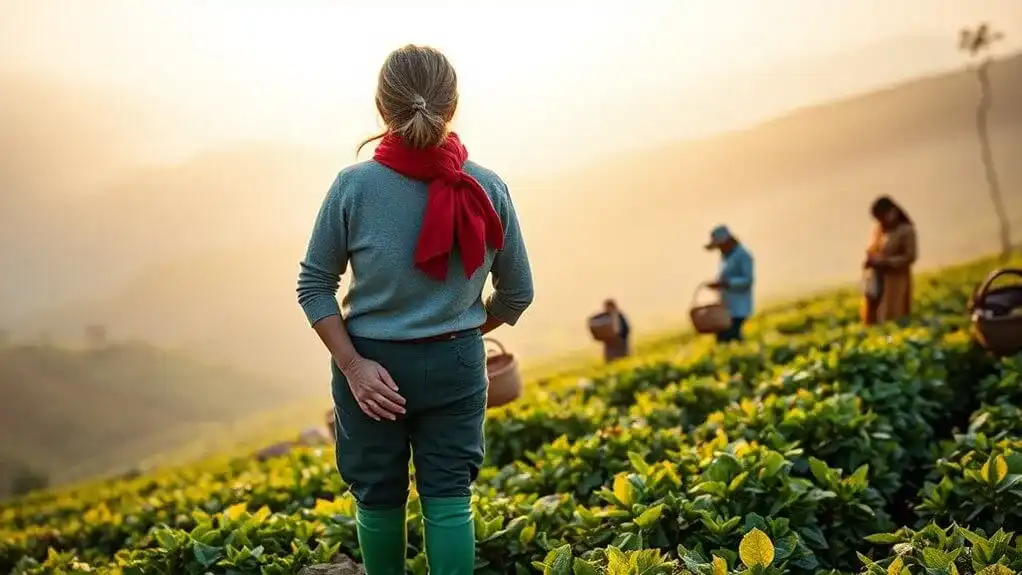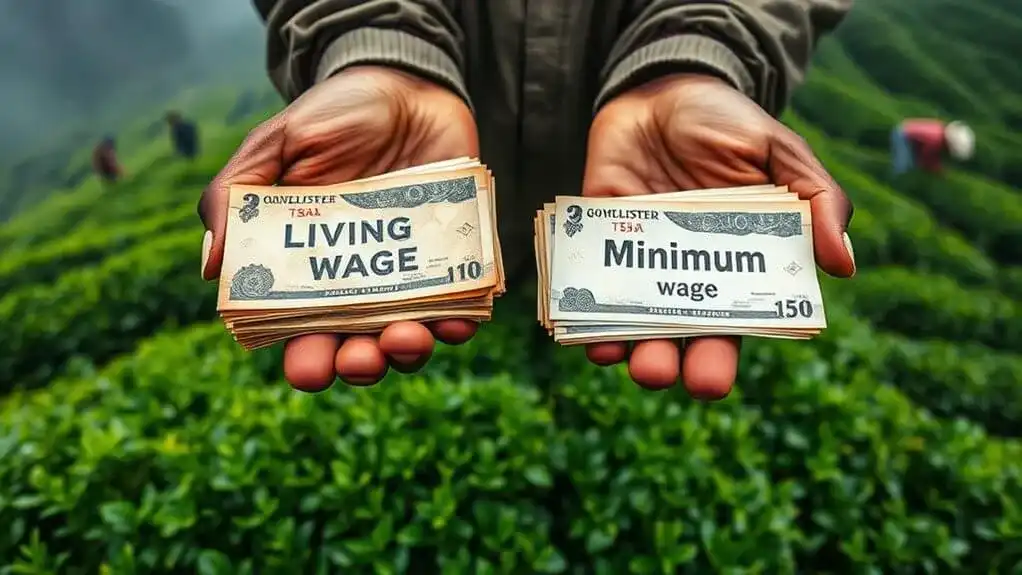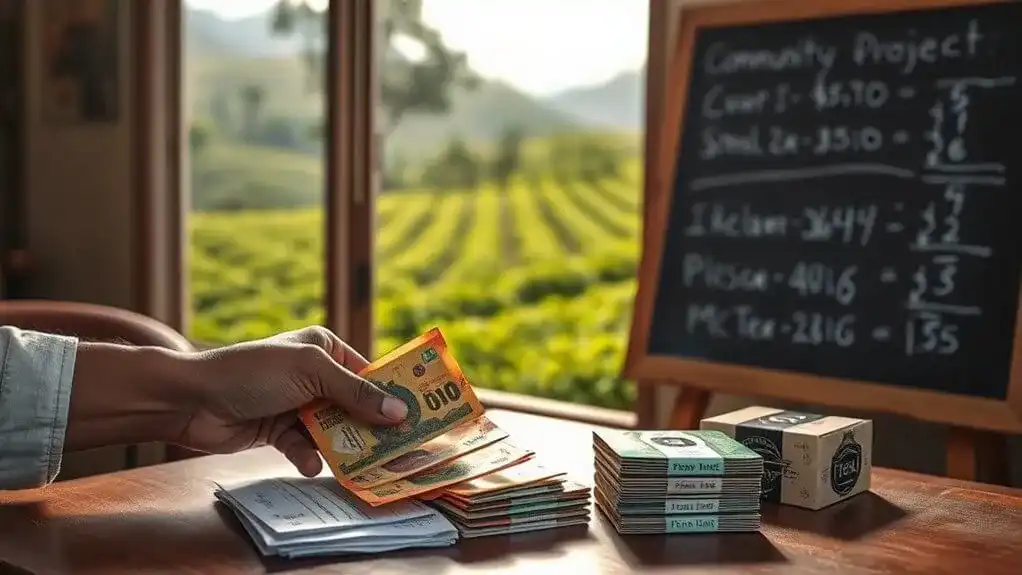Third-party tea sustainability certifications help verify responsible farming practices and fair labor conditions in the global tea industry. Major standards like Rainforest Alliance, Organic, and Fairtrade now represent up to 31% of total production, with strong growth driven by health-conscious consumers in Europe and the US. While certified farmers can earn up to 23% higher prices, they face significant certification costs and compliance challenges. Understanding these complex certification systems reveals the true impact of sustainable tea production.
Key Points
- Third-party certifications like Rainforest Alliance, Organic, and Fairtrade verify sustainable practices through rigorous audits and regular inspections.
- Certified tea farmers can earn up to 23% higher prices but face significant certification costs that may exceed premium earnings.
- Major certifications focus on environmental protection, worker welfare, and chemical-free cultivation methods to ensure sustainable production.
- Consumer recognition prioritizes Organic certification at 95%, followed by other standards like Rainforest Alliance and Fairtrade.
- VSS-compliant tea represents 31% of global production, with strong market growth driven by health-conscious and environmentally aware consumers.
The Rise of Sustainable Tea Certifications

As sustainable practices gain prominence in the tea industry, VSS-compliant tea has emerged as a significant market force, representing up to 31% of global production in 2019. The sector's impressive growth, with a CAGR of up to 31% between 2008 and 2019, reflects increasing consumer demand for tea quality and certification transparency. Despite growing adoption, organic certification standards are not specifically designed to assess broader sustainability impacts. Being the most consumed beverage after water globally has driven the need for these certifications. Recent industry surveys show that organic certification ranks as the most important certification to consumers at 95%.
Major certification schemes like Rainforest Alliance, Organic, and Fairtrade have helped drive this expansion, generating over USD 155 million in farm gate value. Europe and the United States lead the demand, with Europe's organic tea market growing at 10.9% annually. More than one million farmers now produce VSS-compliant tea, responding to consumers' growing preference for healthier beverages and heightened awareness of social and environmental issues. The 2020 merger of Rainforest Alliance and UTZ further streamlined the certification landscape.
Key Players in Tea Certification Standards

The tea certification landscape features several influential organizations and standards that shape sustainable practices worldwide. Key players include trustea, India's sustainability code and verification system, which addresses certification challenges through innovative solutions like the Tracetea App and TCMS. Global certification bodies such as USDA Organic, Rainforest Alliance, and Fair Trade maintain rigorous tea standards focusing on environmental and social responsibility. Implementation partners provide essential support through training and capacity-building initiatives for tea gardens seeking certification.
Industry perspectives are shaped by organizations like Firsd Tea and the Tea & Coffee Trade Journal, which provide valuable insights into sustainability performance. These insights are particularly important as regulations like the EU's Corporate Sustainability Due Diligence Directive and California's Transparency Act push for greater accountability. The industry's digital transformation is evident through emerging trends in traceability solutions and e-learning platforms, making certification processes more efficient and transparent.
Environmental Impact and Ecological Benefits
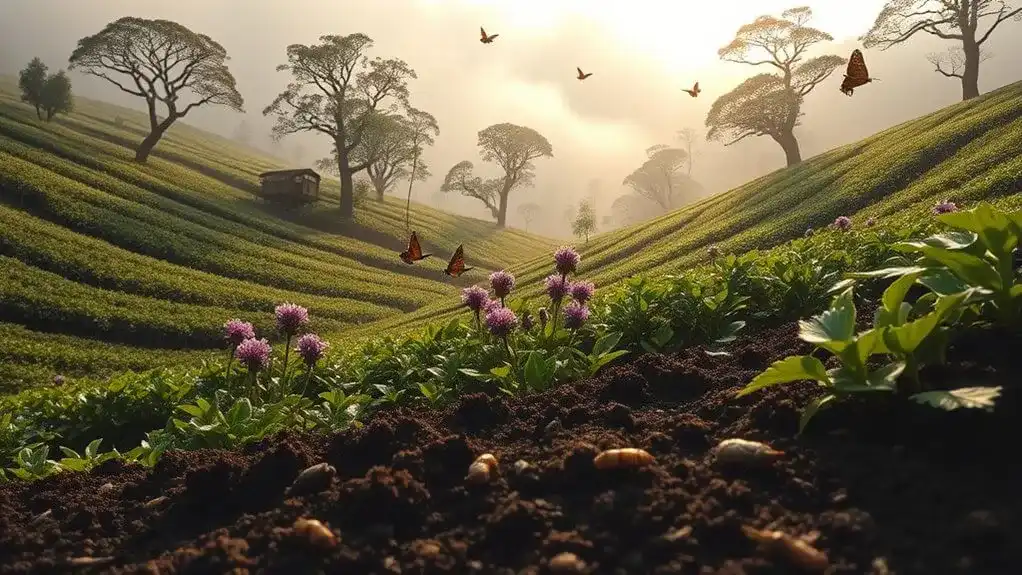
Sustainable tea cultivation plays an essential role in environmental conservation, particularly when producers implement practices that protect local ecosystems and biodiversity. Through biodiversity preservation initiatives like "tea forests," producers integrate native species alongside tea plants, enhancing ecological resilience and maintaining natural habitats. Beneficial insects are increasingly employed as natural pest control alternatives, reducing the need for chemical pesticides. With a commitment to sustainability, producers maintain CO2-neutral production facilities to minimize their carbon footprint. A continuous improvement process ensures that sustainability practices evolve and adapt to changing environmental challenges.
The environmental benefits of sustainable practices include:
- Protection of water sources from pesticide and fertilizer contamination
- Prevention of soil erosion through efficient water management
- Conservation of wildlife through organic farming methods
Third-party certifications, such as Rainforest Alliance and Organic, guarantee these practices are properly implemented. In contrast to conventional methods that often lead to deforestation and ecosystem damage, sustainable tea farming contributes to climate change mitigation through reforestation efforts and reduced chemical use. These practices create a harmonious balance between tea production and environmental stewardship.
Economic Benefits for Tea Farming Communities
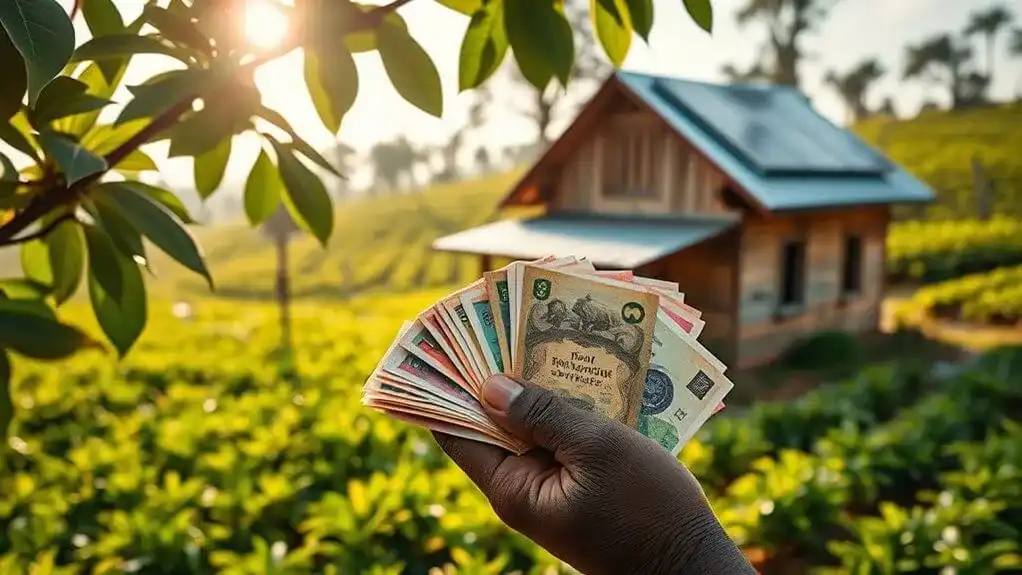
While sustainable tea certification programs promise economic advantages for farmers, their real-world impact varies considerably across regions and markets. VSS-compliant farmers can earn up to 23% higher prices, though these premiums don't always offset certification costs. The introduction of Sustainability Differentials and Investments has created new pathways for farmer empowerment, enabling direct payments through traceability platforms and investment in worker benefits. Two-thirds of workers in the global tea industry are smallholder farmers from developing nations who face significant economic challenges. The Rainforest Alliance supports over 500 farms through tools and knowledge to implement sustainable agricultural practices.
Despite these initiatives, price stability remains a challenge in the highly competitive tea industry. While major brands commit to sustainable sourcing, their focus often prioritizes commercial aspects over social and environmental concerns. To improve outcomes, the sector needs modern auction systems that better value VSS-compliant tea, established minimum prices, and reduced certification costs for growers. These changes could help create more equitable economic benefits for tea farming communities.
Navigating Certification Challenges and Costs
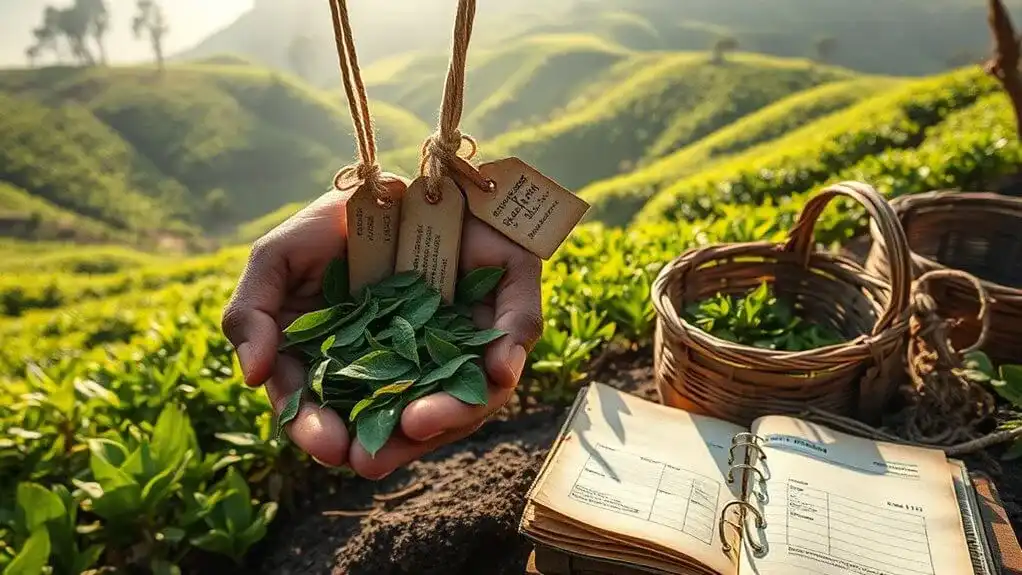
Although sustainable tea certification promises enhanced market access, farmers face substantial financial hurdles in achieving compliance. Certification expenses run at least 100% higher than conventional farming due to stricter agricultural practices, quality management systems, and social standards. Smallholders particularly struggle with audit challenges and documentation requirements, often forcing them to seek group certifications to share costs.
The harsh reality of certification costs impacts farmers in several ways:
- Many can't recover their investment, as VSS-compliant tea frequently sells at conventional prices
- Audit requirements and new management practices strain limited resources
- Small-scale farmers risk falling into debt while trying to maintain certification standards
Despite potentially earning up to 23% higher prices for certified tea, most farmers find these premiums insufficient to offset the significant certification expenses and operational changes required for compliance. The withdrawal of chemical fertilizers substantially affects production efficiency, creating additional strain on farmers' operational budgets.
From Farm to Cup: The Certification Process

For tea producers seeking certification, the journey from farm to cup involves a rigorous process overseen by several major certifying bodies. Organizations like UTZ, Rainforest Alliance, and Fair Trade International maintain strict standards through extensive audit procedures. The certification timeline includes thorough inspections of farming practices, working conditions, and supply chain management.
Each certification body enforces its unique Code of Conduct, which producers must follow to maintain their status. UTZ tracks products through their Good Inside Portal, while USDA Organic certification demands adherence to chemical-free farming methods. Regular audits guarantee ongoing compliance with sustainability standards, worker safety protocols, and environmental protection measures. Throughout this process, certified farms must demonstrate their commitment to fair wages, safe working conditions, and sustainable agricultural practices.
Consumer Guide to Tea Sustainability Labels
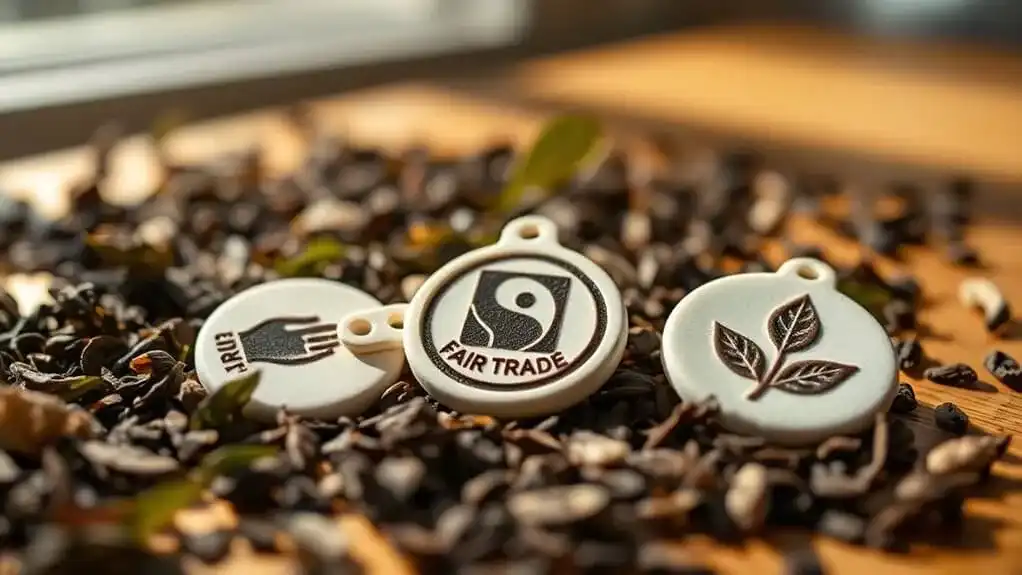
When shopping for sustainable tea, consumers often encounter a variety of certification labels that can seem overwhelming at first glance. Understanding these labels empowers shoppers to make informed decisions about their tea types and supports sustainable practices worldwide. The most recognized certifications include USDA Organic, Fair Trade, and Rainforest Alliance, each ensuring different aspects of sustainability. Soil composting methods used in organic tea farming help maintain long-term agricultural sustainability without synthetic additives. Worker well-being is a crucial focus of these certifications, particularly through programs like Rainforest Alliance. Certifications help eliminate harmful ingredients commonly found in conventional teas.
Consumer choices in sustainable tea can make a significant impact:
- Supporting fair wages and better working conditions for tea farmers
- Protecting wildlife and preserving natural ecosystems
- Ensuring chemical-free cultivation for healthier tea options
To navigate these certifications effectively, consumers should look for clear label transparency and verify that certifications come from reputable third-party organizations. Regular audits and global recognition of these certifications help maintain high standards across different tea types and production methods.
Global Market Trends and Future Outlook
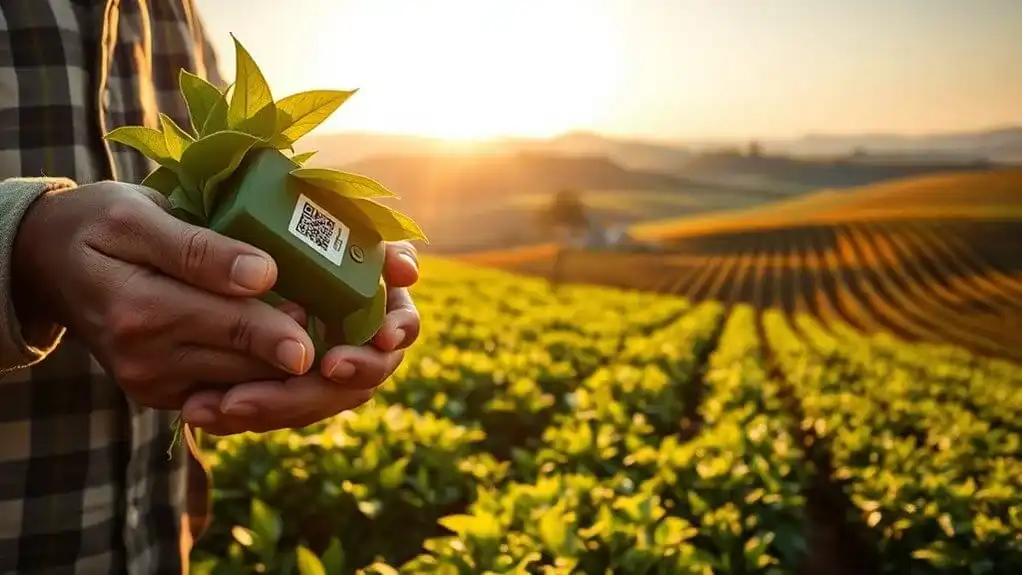
The global sustainable tea market has shown remarkable growth, with VSS-compliant tea now representing up to 31% of total production. Market dynamics indicate a strong CAGR of 29% to 31% between 2008 and 2019, with the sector valued at over USD 155 million in 2019. Rainforest Alliance leads certification schemes in production volume, while organic certification continues to gain traction in Europe and the United States.
Consumer behavior is increasingly driven by health consciousness and environmental awareness, pushing the organic tea market toward an expected 8.4% CAGR through 2026. However, significant price barriers persist, with conventional teas being substantially cheaper. The Rainforest Alliance certification addresses these challenges through rigorous sustainability standards that assess environmental, social, and economic practices. The industry's future outlook emphasizes regenerative farming practices and stronger supply chain engagement, though challenges remain in demonstrating VSS impact on farmer livelihoods and maintaining growth momentum.
Conclusion
Tea sustainability certifications continue to evolve, reshape farming practices, and transform global supply chains. While certification programs face ongoing challenges in implementation and costs, they're creating positive changes through improved environmental stewardship, enhanced farmer livelihoods, and greater market transparency. As consumers grow more conscious of their purchasing power, these certifications aren't just setting industry standards—they're building bridges between mindful consumers and responsible producers worldwide.

